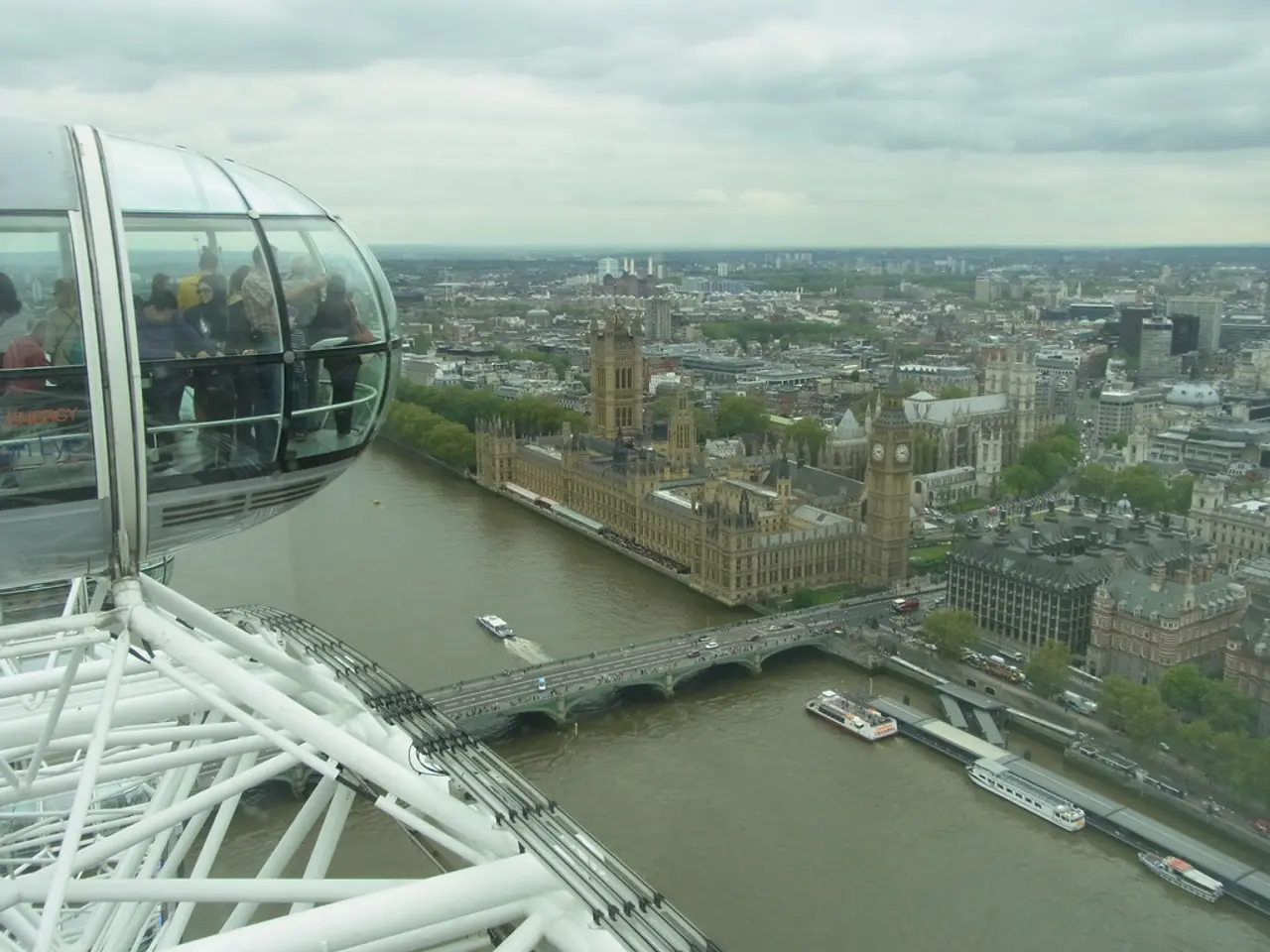Germany's Vice Chancellor: A Look at Lars Klingbeil
Kicking Off a New Era: Germany's Power Struggle
In the heart of Europe, a new chapter unfolds as Lars Klingbeil, the strong-willed leader of the left-leaning Social Democratic Party (SPD), steps into the limelight. With the party securing a disappointing record-low 16% in the February 23 elections, Klingbeil remains steadfast as both party co-chairman and tentative leader of the parliamentary group.
After a grueling battle with Friedrich Merz from the conservative Christian Democratic Union (CDU), Klingbeil clinched key government posts, including finance minister and vice chancellor for himself. In a bold move, he took on the challenge of reshaping the nation's future, vowing for teamwork, courage, and increased trust in the citizens.
Germany Shuffles its Power Players
Navigating the political landscape, Klingbeil made some surprising moves during the cabinet formation. notable figures such as Svenja Schulze, long-standing minister for the environment and development, Hubertus Heil, labor minister, and Nancy Faeser, interior minister, had no place in the new government, signifying a shift in priorities for the SPD. Remarkably, only Boris Pistorius, the popular defense minister, managed to maintain a place in the new cabinet, which is set to be led by Chancellor Friedrich Merz.
As a political scientist, Karl-Rudolf Korte raised eyebrows when he labeled the concentration of power in Klingbeil's hands as "unusual." In the midst of government formation, a power struggle ensued, with the SPD's Klingbeil emerging as a significant force and Saskia Esken, the party's co-chair, leaving the leadership role with no significant assignments in the new government.
A New Face for Germany's Cabinet
With the new governing coalition in place, here is a brief glimpse of the individuals shaping the country's destiny:
Chancellor: Friedrich Merz
With his contentious election and towering challenges ahead, 69-year-old lawyer Merz grapples with revitalizing the economy, curbing the surge of right-wing extremists, and maintaining the populace's trust.
Vice Chancellor/Finance Minister: Lars Klingbeil (SPD)
The ambitious SPD leader takes on the financial burdens, as well as the trials and tribulations of maintaining a left-leaning presence amidst the right-wing dominance.
Defense Minister: Boris Pistorius (SPD)
As the only SPD minister remaining, Defense Minister Pistorius strives to upgrade the military forces, ensuring they remain battle-ready.
Foreign Minister: Johann Wadephul (CDU)
A seasoned politician with a strong international network, Wadephul promises to work alongside Merz, consistently exhibiting diplomatic prowess.
Interior Minister: Alexander Dobrindt (CSU)
Dobrindt, a sociologist with a reputation for toughness, will focus on immigration matters, advocating for stricter border enforcement and family reunification limitations.
Labor and Social Affairs Minister: Bärbel Bas (SPD)
A rising star with roots in the working class, Bas steps into a ministry with the largest budget, aiming to forge a brighter future for the German workforce.
Economy Minister: Katja Reiche (CDU)
A former chemical expert returning to the political scene, Reiche aims to rejuvenate the economy, putting her extensive knowledge and experience to good use.
Digitalization and Modernization Minister: Karsten Wildberger
An expert in digital transformation, Wildberger takes the reins of a brand-new ministry, promising to steer the country into the future with innovative technological solutions.
Development Minister: Reem Alabali-Radovan (SPD)
With a multicultural background and impressive diplomatic skills, Alabali-Radovan offers a new perspective to the coalition, engaging enthusiastically in the global community.
Justice Minister: Stefanie Hubig (SPD)
Hubig, a lawyer with a notable educational background, combines her years of judicial experience to lead the Justice Ministry effectively.
Environment Minister: Carsten Schneider (SPD)
Dedicated to conserving the planet and ensuring prosperity for Eastern Germany, Schneider joins the cabinet as a partner for lasting change.
Research, Technology and Space Minister: Dorothee Baer (CSU)
A rising talent within the CSU, Baer is ready to take on the challenges of pioneering innovation, working to pave the way for a technology-driven future.
Construction Minister: Verena Hubertz (SPD)
With her roots in the business world and a tenacious spirit, Hubertz tackles the notorious housing shortage head-on, promising sustainability and prosperity for all Germans.
Health Minister: Nina Warken (CDU)
An unexpected pick with a background in law, Warken embraces the challenge of familiarizing herself with the healthcare sector and crafting policies to promote wellness and security.
Education and Family Affairs Minister: Karin Prien (CDU)
A seasoned education expert with strong opinions, Prien is poised to face the challenges ahead, advocating for quality education and family values.
Agriculture Minister: Alois Rainer (CSU)
Having trained as a butcher, Rainer's extensive background in family business and local politics aligns with the CSU's goals for a more agricultural-focused policy.
Transport Minister: Patrick Schnieder (CDU)
With a substantial part of the $568 billion infrastructure fund allocated for transportation renovation, Schnieder prepares to transform the nation's roadways for the better.
Chancellor's Office: Thorsten Frei (CDU)
A close confidant of Merz, Frei seeks to support his leader by clearing potential obstacles and ensuring smooth operations within the coalition.
Federal Commissioner for Culture and the Media: Wolfram Weimer
With a clear focus on conservative culture and media policies, Weimer aims to shape the nation's arts and entertainment landscape with traditional values at its core.
Klingbeil: From Community Service to Power
Born to a loving family in Munster, Lower Saxony, Klingbeil's political journey mirrors that of many Social Democrats. Participating in the Friedrich Ebert Foundation and working for Schroder, Klingbeil solidified his commitment to the party. A turning point came during the 9/11 attacks, which persuaded him to embrace a stronger stance on military defense.
Overcoming adversity, Klingbeil successfully recovered from tongue cancer, married in 2019, and became a first-time father in 2020. A former guitarist, Klingbeil continues to play music in his free time—a testament to his lively spirit and adaptability in the face of life's challenges.
This refreshed content draws upon existing sources in German and is intended to offer a revised, engaging take on the post-2025 German political climate.
- Stay informed about the latest developments in German politics: Enroll in our weekly newsletter, Berlin Briefing, for updates on the nation's political landscape straight to your inbox.*
- In the evolving international political scene, the focus has shifted to Germany as Lars Klingbeil, the SPD's leader, pioneers a new era.
- Amidst the shifting tides of politics, Klingbeil's bold moves show promise for Germany's future, with a keen emphasis on teamwork and courage.
- The world watches as key positions are filled within Germany's coalition government, with some surprising additions and omissions in the cabinet.
- As media attention highlights the power struggle, a new face emerges in the leadership role: 69-year-old Friedrich Merz, the towering figure of the CDU.
- Stepping into the finance ministry, Lars Klingbeil faces increasing pressure as he attempts to maintain the SPD's presence amidst right-wing dominance.
- Beyond Europe's borders, the global community takes notice as Germany's culture and media policies receive a conservative overhaul, under the guidance of Federal Commissioner Wolfram Weimer.
- In the digital age, Germany seeks to modernize and innovate through the digitalization and modernization ministry, led by Karsten Wildberger, an expert in digital transformation.







